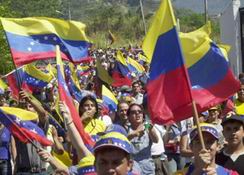Venezuela delays referendum rule as tension grows
 President Chavez insisted he won’t resign as Haitian leader Arisitde did and denounced a US campaign to oust him.
President Chavez insisted he won’t resign as Haitian leader Arisitde did and denounced a US campaign to oust him.
Last weekend, clashes between government supporters and opposition protesters left three killed in Caracas and an uncertain number of wounded.
The situation in Venezuela grows in tension day after day, as the National Electoral Council delays a preliminary ruling on whether president Hugo Chavez Frias will face a recall referendum on his term, which expires in 2006. Last weekend, clashes between opposition protesters and government supporters left at least three killed and an uncertain number of wounded. On Monday, anti-government protesters tightened blockades on streets and highways throughout Venezuela in a fourth day of demonstrations.
Demonstrators lit tires and garbage at intersections throughout Caracas' wealthier neighborhoods -- the center of opposition against Chavez -- after the national election council said it would delay for a month a ruling on whether the opposition collected enough signatures to force a referendum. A suggestive information on the aggravation of the crisis in Venezuela came from Wall Street: the South American country's bonds fell to a three-month low on concern Chavez will block the recall vote.
Even more suggestive is the following comment quoted as said by Bloomberg news agency: “Recent events are increasing the political risk associated with holding Venezuelan debt,'' might have said Mohamed El-Erian, who manages $12 billion of emerging-market debt at Pacific Investment Management Co. in Newport Beach, CA. He declined to say whether he holds Venezuelan bonds.
Also on Monday, James Carter’s Institute observers had to call on a news conference to confirm they would keep on making efforts to promote the dialogue between both parts, shortly after rumours about a possible quit. Electoral authorities said they would rule on Monday on whether the opposition had gained the 2.4 million valid signatures required for a vote. The opposition is urging the Council for a response because, according to Constitution, if the recall referendum takes place after half of presidential term –i.e. August- country’s vice-president should take over until it expires.
PRAVDA.Ru source said the stituation was too delicate in Venezuela, as it does not look that the strained relations between the government and its opponents will be resolved easily in the short term. “The society is divided in two; we are very worried about that”, he said. The source, a very close collaborator of Argentine President Nestor Kirchner, visited Venezuela last week to attend to a Third World leaders summit.
“Venezuela is not Haiti”
On Sunday, at least 60,000 supporters marched in the capital and converged for a rally led by Chavez. Chavez - who says the US is backing opposition efforts to topple his leftist government - accused US President George W Bush of heeding advice from "imperialist" aides to support a brief 2002 coup against him.
"He was an asshole to believe them," Chavez said to his followers. The president also threatened to cut off oil supplies to the US, should Washington try an invasion or trade sanctions.
Then, Chavez insisted he would not resign. "Venezuela is not Haiti and Chavez is not Aristide," he said. Haiti's President Jean-Betrand Aristide resigned at the weekend in the face of protests and rebellion.
In turn, opposition leader Enrique Mendoza called on his supporters to continue with “peaceful resistance," as promised that the “fight will last as long as necessary."
Hernan Etchaleco
Subscribe to Pravda.Ru Telegram channel, Facebook, RSS!





